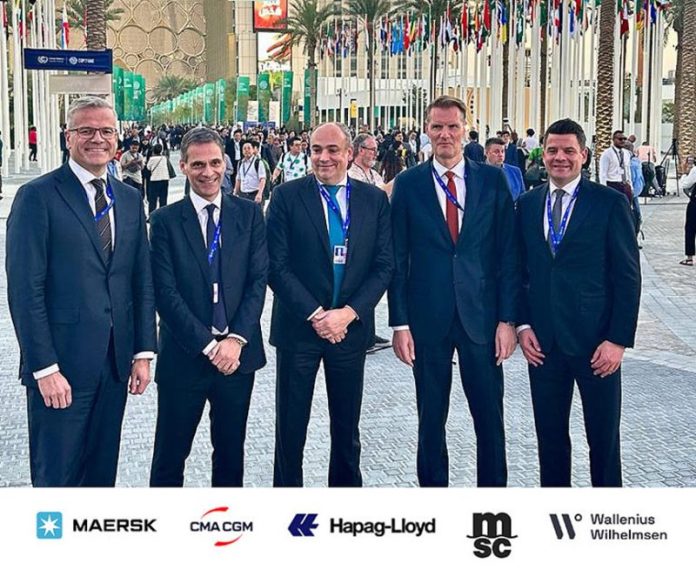
-
CEOs of major global shipping lines joined forces at the 28th United Nations Climate Change Conference, urging an end date for fossil-only powered newbuilds
-
A joint declaration called for four regulatory cornerstones, including an end date for fossil fuel-only vessels and a greenhouse gas intensity standard timeline
-
The CEOs emphasized the urgent need for collaboration with regulators to accelerate the industry’s transition to green fuels
-
Proposed regulatory measures include an effective greenhouse gas pricing mechanism, vessel pooling for compliance, and a Well-to-Wake greenhouse gas regulatory basis
-
Industry leaders stressed the importance of a collective commitment to mitigating the costs of the green transition and addressing risks associated with climate change
The chief executives of the world’s leading global shipping lines have come together to issue a joint declaration at COP 28 (28th United Nations Climate Change Conference), calling for a decisive end date for fossil-only powered newbuilds.
The CEOs of A.P. Moller-Maersk, CMA CGM, Hapag-Lloyd, MSC Mediterranean Shipping and Wallenius Wilhemsen urged the International Maritime Organization (IMO), the global regulator, to create the rules that will speed up the shift to green fuels in the maritime industry.
Rising global temperatures highlight the pressing need to tackle climate change. Shipping, contributing 2-3% of global greenhouse gas (GHG) emissions, plays a crucial role in meeting the IMO’s 2030, 2040, and net-zero 2050 GHG reduction targets. The CEOs stress the industry’s vital move towards a rapid shift from fossil to green fuels as the practical solution.
To show their dedication to the IMO’s GHG reduction goals, the CEOs highlighted the importance of working closely with IMO regulators. They believe this collaboration will produce practical policies crucial for supporting investments in maritime shipping and related industries, speeding up the necessary decarbonization.
The joint declaration articulates a call for the establishment of four regulatory ‘cornerstones’:
- End Date for Fossil Fuel-Only Vessels: The CEOs advocate for a definitive end date for the construction of fossil fuel-only vessels. Additionally, they propose a clear GHG Intensity Standard timeline, providing the industry with confidence to invest in both new ships and the requisite fuel supply infrastructure, thereby expediting the energy transition.
- Effective GHG Pricing Mechanism: CEOs suggest a pricing plan to make green fuel competitive with traditional black fuel during the transition. By spreading the extra cost for green fuels across all fossil fuel types and adding incentives for more emissions reductions, the plan aims to limit price increases. The generated revenue is proposed to support a research fund and investments in developing countries for a fair transition.
- Vessel Pooling for GHG Compliance: They suggest a vessel pooling option for GHG compliance. This means a group of vessels’ performance counts, not just individual ships. It ensures investments go where they can make the most GHG reduction, speeding up decarbonization globally.
- Well-to-Wake GHG Regulatory Basis: The CEOs advocate for a Well-to-Wake or lifecycle GHG regulatory basis to align investment decisions with climate interests and mitigate the risk of stranded assets.
The major players in the shipping industry expressed their shared conviction that regulation can play a pivotal role in mitigating the costs of the green transition and the risks associated with extreme weather events.
Recognizing the greater cost of climate change compared to the green transition, they anticipate the support of other companies in this collective effort.
Vincent Clerc, CEO of A.P. Moller-Maersk, in a statement said, “The momentum for green fuel is building, and we are pleased to see strong partnerships across the industry as we continue our joint efforts of making decarbonization in shipping successful.”
Rodolphe Saadé, chairman and CEO of the CMA CGM Group, echoed this sentiment, saying, “By collaborating with others, we each take a new step in our energy transition, while ensuring a collective level playing field and access to greener fuels for the industry.”
Rolf Habben Jansen, CEO of Hapag-Lloyd, reinforced their commitment, saying, “We believe that a regulatory framework and clear targets are crucial to accelerating the introduction of alternative fuels and reducing our carbon footprint.”
Soren Toft, CEO of MSC Mediterranean Shipping Company, emphasized the need for global support, saying, “Today it feels like we are one step closer in this regard, but concrete supply of alternative fuels and globally recognised GHG pricing are essential to achieve our goals.”
Lasse Kristoffersen, president and CEO of Wallenius Wilhelmsen, stressed the need for a global regulatory framework, stating, “Now, we need a global regulatory framework matching this ambition to drive the investments needed at a global scale.”
In unison, these industry leaders are taking decisive steps towards a sustainable future, setting an example for responsible corporate practices that resonate with the global public.




